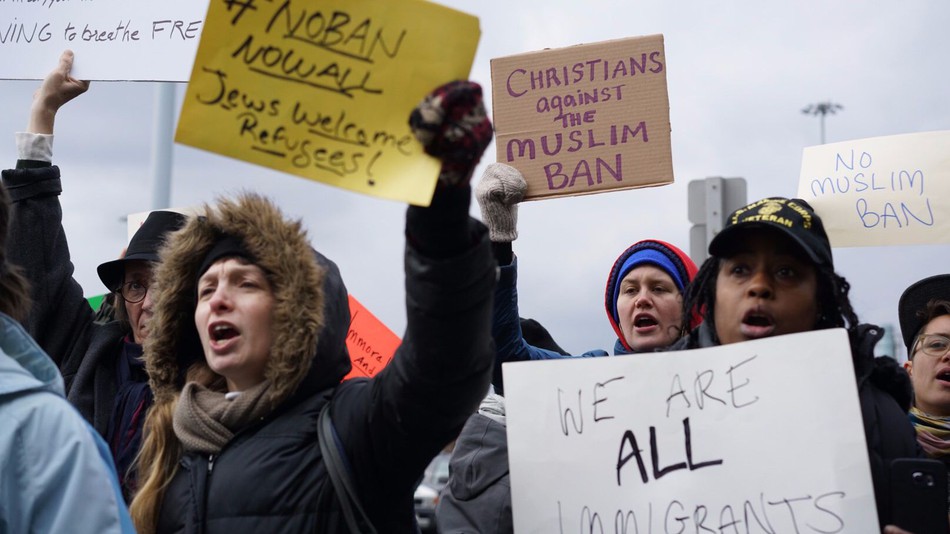By: Richard T. Herman, Esq. – Immigration Lawyer

On June 26, the U.S. Supreme Court issued its ruling on Trump’s travel ban affecting six countries in the Muslim world: Yemen, Syria, Libya, Iran, Somalia and Sudan.
Before explaining the Court’s decision, allow me to briefly outline the events leading up to it.
On March 6, President Donald Trump issued an executive order calling for the suspension of entry into the United States for nationals of six countries – Iran, Libya, Somalia, Sudan, Syria, and Yemen – for 90 days from the effective date of the order. This executive order also called for the suspension of decisions on refugee status, and travel of refugees from all nations into the U.S. for 120 days, and lowered the maximum number of refugees allowed entry in to the U.S. in fiscal year 2017 from 110,000 to 50,000.
The stated purpose was to give Homeland Security time to conduct a global review to determine whether foreign governments provide adequate information about their nationals applying for U.S. visas.
International Refugees Assistance Project (a non-profit organization serving refugees) and the State of Hawaii filed separate lawsuits challenging the executive order, arguing that it violated the U.S. Constitution by being motivated not by national security, but by animus against Islam. They also argued that the president’s actions exceeded the authority given to him under the Immigration and Nationality Act (INA).
The 4th Circuit Court of Appeals agreed with the first argument, and stopped the government from implementing the executive order, citing statements made by Trump and his advisers during his campaign and after his election about finding a way to legally implement a Muslim ban.
The 9th Circuit Court of Appeals also blocked the executive order under the second argument, that the President exceeded his authority under the INA, which gives the President the power to suspend entry of “aliens or any class of aliens” if he finds that they are “detrimental to the national interest,” but also states that “no person shall be given preference or discriminated against in the issuance of an immigrant visa because of their race, sex, nationality, place of birth, or place of residence.”
On June 26, the Supreme Court consolidated the cases and partially lifted the injunctions, allowing the government to partially implement the executive order for 90 days starting 8:00 PM (EDT) on June 29. However, the Supreme Court also limited the executive order, holding that the Trump administration cannot shut out any traveler from the six affected nations who has a “bona fide relationship” with a person or entity in the U.S. Some examples the court used were the Iranian wife of a lawful permanent resident (green-card holder) in the U.S. whose husband had petitioned for her to join him here, the Syrian mother-in-law of a U.S. citizen imam who wanted to come visit, students who had been accepted to American universities, workers who had accepted job offers from American companies, or lecturers who had been invited to speak to American audiences.
The State Department has interpreted “close familial relationship” to include parents, spouses, children, adult sons or daughters, sons-in-law, daughters-in-law, or siblings, including step-siblings and other step-family relations. Fiancés/fiancées were initially not included, but were later added to the list. However, relationships such as grandparents, grandchildren, aunts, uncles, nieces, nephews, cousins, brothers-in-law and sisters-in-law, or any other extended family relationships were not considered close family.
As for refugees, the State Department has interpreted the executive order and the Supreme Court ruling to mean that refugees will be admitted up to July 6, but not for 120 days beyond that. The ban also does not apply to nationals of the six affected nations who were in the U.S. on June 26, had a valid visa issued before the executive order was signed 5:00 PM on June 27, who had a valid visa on June 29, who have lawful permanent residency in the U.S., who have advance parole valid as of June 29, who have dual nationality and are traveling under a non-banned nation’s passport, who have been granted asylum, refugees who have already been admitted, or have been granted withholding of removal, advance parole, or withholding under the Convention Against Torture.
The State of Hawaii filed an emergency motion on June 29, asking that the Supreme Court clarify its ruling and bar the government from implementing its ban against grandparents, grandchildren, brothers-in-law, sisters-in-law, aunts, uncles, nieces, nephews, and cousins of persons in the United States. Hawaii also asked that the Supreme Court keep the government from applying its ban against refugees with a bona fide relationship with a person or entity in the United States, and that the government be barred from applying a presumption that aliens lack a bona fide relationship with persons or entities in the United States. The last point is important because it potentially shifts the burden of proof from having to prove that you have a bona fide relationship with a person or entity in the U.S. to the government having to prove that you do not.
Although Iraq is not part of the executive order, the State Department has decided that even Iraqi individuals in the Direct Assistance Program for U.S.-affiliated Iraqis who have provided assistance to the U.S. military, U.S. military contractors, or U.S. media are not automatically exempt from the refugee ban, but will be evaluated on a case-by-case basis. Hawaii has argued that this is not fair, as these refugees and other refugees may have already spent months or years in the refugee resettlement process, passing interviews and other layers of document processing, only to be blocked because they do not have an arrival date before July 6.
What does this mean in practical terms? If you or your loved ones are nationals of the one of the six designated countries, you should not leave the U.S. if you are already in the U.S. Be particularly careful when visiting areas like Niagara Falls, New York or Port Huron, Michigan, where you may inadvertently cross the border into Canada if you take a wrong turn. If you already hold a valid immigrant or non-immigrant visa to the U.S., you are permitted to present yourself at the border to request entry, but U.S. Customs & Border always retains discretion to permit or deny entry.
If you are a national of one of the affected countries and are applying for a visa, or presenting yourself at the border, you should prepare evidence of a documented bona fide relationship with persons or entities in the U.S., such as acceptance letters, I-20s, or IAP-66s from accredited American universities, birth or marriage certificates proving relationships with your U.S. citizen or legal permanent resident family members, job offer letters from American companies, invitation letters from American organizations, or any other official documents that can prove you have had existing relationships with persons or entities in America.
While there is much uncertainty on how these standards will be applied in the field, three things remain certain.
One, immigrants, particularly those from predominantly Muslim nations, will sadly continue to face unjustified scrutiny by U.S. immigration officials.
Two, U.S. history shows that politicians will often scapegoat immigrants and try to use anti-immigrant sentiment to obtain political power.
Three, U.S. history also shows that immigrants, all peaceful immigrants, have contributed mightily to our country.. Whether its entrepreneurship, work ethic, resilience, the important of family, American patriotism, and the keeper of the American Dream, immigrants will continue to Make American Great.
Stay strong. We will get through this. We always do.
—————————————-
Richard Herman is a nationally known immigration lawyer and the founder of the Herman Legal Group, an immigration law firm founded in 1995 and recognized in U.S. World News & Report’s “2016 Best Law Firms in America” as well as Super Lawyers© for more than ten consecutive years,. The firm serves clients in over 12 languages from offices in Detroit, Cleveland and Columbus, and represents diverse clientele from Fortune 500 companies to undocumented workers, from technology entrepreneurs to NFL teams. The Herman Legal Group helps families with marriage green cards, fiancée visas, deportation defense, political asylum, hardship waivers and naturalization. As a lawyer, activist, author and speaker, he has dedicated his life to advocating for immigrants and helping change the conversation on immigration. He is the co-author of the acclaimed book, Immigrant, Inc. —Why Immigrant Entrepreneurs Are Driving the New Economy (John Wiley & Sons, 2009). Known for his direct and sometimes controversial style, Richard has appeared on FOX News (The O’Reilly Factor), National Public Radio, and has appeared in the New York Times, USA Today, BusinessWeek, Forbes, Inc., Computerworld, TechCrunch and InformationWeek.
Contact Richard at (313) 681-5775: Herman Legal Group, 7301 Schaefer Rd, Suite 103, Dearborn, Michigan 48126. Richard considers it an honor to serve the Arab community and invites you to call with all of your immigration questions.
Immigration is a hot topic in today’s America, and each case has unique facts that may change how the U.S. government handles it. This article is for informational purposes only, and reflects the firm’s opinions and views on general issues. No prediction, warranty, or guarantee can be made about the results of any case. Should you need or want legal advice about your particular situation, you should consult with and retain professional legal counsel of your choice.












